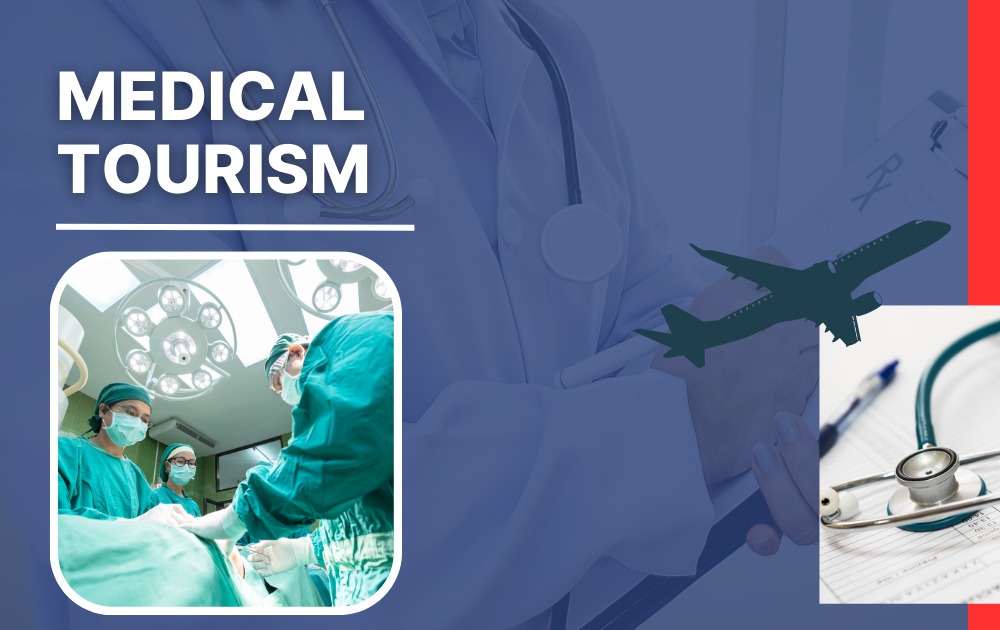Medical Tourism continues to be on fast-track in 2023 with Indian hospitals expanding the range of services making it a holistic experience for international patients

RAO NARENDER YADAV / New Delhi
Medical tourism represents a growing global phenomenon, and India definitely has emerged as a preferred destination for millions. Coming out from the slumber of COVID period, Indian medical tourism sector has experienced consistent growth in the last two years. The influx of medical tourists to India has grown steadily from 1.83 lakh in 2020 to 5.04 lakh in 2023 (till October) and the trend is likely to gain momentum in the near future.
For African countries, India is one of the most preferred options for medical treatment given its affordability and international standards of treatment. In 2020, 19.5% of the total tourists from Africa visited India for medical purposes and the trend has seen an upward trajectory since then, once the travel restrictions were removed post-COVID. As per the data available with the Home Ministry, about 825,000 medical visas were issued to foreigners, mostly in African nations, between 2019 and 2021.
Dr. Aashish Chaudhry, Managing Director, Aakash Healthcare Super Speciality Hospital Dwarka shares, “The inflow of international patients has significantly improved after the COVID pandemic has subsided. We have seen a steady growth of patients from CIS (Belarus, Kazakhstan, Kyrgyzstan, Russian Federation, and Tajikistan), African and GCC (Gulf Cooperation Council) countries. On an average Aakash Hospital gets 600-700 patients from Africa every year, who come for treatment related to orthopaedics & joint replacement, kidney transplant, liver transplant, cancer surgery, bariatric surgery etc.”
Credit rating agency ICRA identifies a robust revival in medical tourism as one of the main contributors to a sequential improvement in patient footfall at hospitals throughout the FY23. Maintaining a stable outlook for the Indian hospital industry, ICRA said the industry’s performance is being driven by a surge in non-communicable lifestyle diseases, increasing per capita healthcare spending, rising awareness, expanded health insurance coverage, and a rise in medical tourism.
According to Mythri Macherla, Assistant Vice President & Sector Head, ICRA , “Supported by sustained improvement in demand, ICRA’s sample set companies have announced sizeable expansion plans with the addition of over 8,400 beds and an upgradation/refurbishment plan over the next four years. This translates to over 26% increase in capacity vis-à-vis March 2023 levels. With robust accruals, the debt metrics are expected to remain strong going forward, despite incremental debt funding for expansion.”
HFS Research also expects the medical tourism market to grow at a CAGR of more than 20% between 2023 and 2027 to more than US $35 billion from its current US $6 billion.
Focus on patient-centric facilities to provide holistic care
Overcoming language barriers, cultural differences, and logistics has been the biggest challenges faced by the visiting patients. Hospitals and Medical Travel Facilitators (MTFs) have been increasingly focusing on improving the overall experience of the visitors.

“To ensure that foreign patients get hassle free admission and have comfortable experience during their treatment, we have established an international patient lounge and a dedicated desk at the entrance of the hospital. There is a separate floor for foreign patients with round the clock multilingual staff stationed there well versed in languages like Arabic, Bengali and French,” shares Chaudhry.
“To minimise local travel time, patients, particularly those requiring longer stay for treatment are also being provided accommodation facilities by us. Well-connected with the airport and located in close proximity to the hospital, these are ‘homes away from home’ equipped with trained staff, to facilitate their admission, appointment and scheduling of their surgery and the attendant need not to worry for any coordination work,” adds Chaudhry.
The growing number of African patients, particularly from Nigeria, South Africa, Kenya, Angola and Somalia, has also led to the growth of medical value facilitator’s in several African countries, particularly Nigeria. Even during the last decade, Nigerians spent over $1 billion annually on availing medical tourism services in various countries, as per Price Waterhouse Coopers 2016 report. In 2019 alone, Indian hospitals generated more than $ 300 million from Nigerians for medical treatment.

Ezeugo Nnamdi, Co-Founder, Exelient Africa believes that India’s long standing cultural and bilateral ties with African countries has played an important role in establishing a strong foundation for medical business. “There is a resilient people-to-people connect. At some point, almost every educational institution in Africa had Indian teachers, who were committed to build the capacities and skills of African youth. Thus, having shared experiences is often attributed to the fondness exhibited towards each other as was seen during India’s presidency of G20 and the inclusion of African Union as a member.”
However, Nnamdi feels that there has been a growing competition in the recent years for medical services. “There’s also the introduction of newer dimensions of the business and other countries such as Turkey, Egypt, China, Russia and France are posing good competition with advantage of huge investment in healthcare infrastructure in Nigeria. It calls for the need to solidly establishing the Indian standard and presence in the region as to garner the edge of harnessing from the existing brotherhood between Indians and Nigerians.” This could be a long-term win-win situation for both India and Africa.
Global Scenario
The global medical tourism market is poised for sustained growth in the next few years. According to the Medical Tourism Global Market Report 2023, it will grow from $35.77 billion in 2022 to $39.95 billion in 2023 at a compound annual growth rate (CAGR) of 11.7 percent. By 2027, it is expected to grow to $59.67 billion at a CAGR of 10.5 percent.
With a strong policy push, strengthening of medical tourism ecosystem, robust health infrastructure and affordability of treatment, India definitely can positions itself as a global health destination.